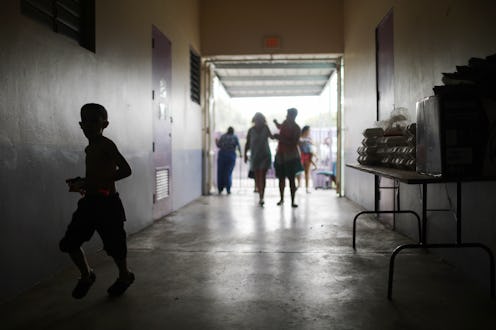News
Puerto Rico Is Closing 283 Schools & Teachers Say The Reasons Are Super Suspect

Puerto Rico's education woes didn't start with Hurricane Maria, but the devastation wreaked by the storm has left the territory's education system in serious distress. It's all contributed to the island's Department of Education announcing that 283 schools in Puerto Rico are closing over the upcoming summer break, but teachers are saying the reasons for the closures are super suspect.
As the Associated Press reports, Puerto Rico is currently operating 1,100 public schools with a total of 319,000 enrolled students. Since May 2017, Puerto Rico has lost 38,700 public school students — many of them after Hurricane Maria devastated much of the island.
At least part of the decision to close 283 schools appears to be a financial one. “Our children deserve the best education that we are capable of giving them taking into account Puerto Rico’s fiscal reality," said Puerto Rico's education secretary, Julia Keleher.
Eshe Nelson at Quartz outlines the hard economic times that were already plaguing Puerto Rico before Maria. The island's economy had "been almost continuously in a recession for more than a decade," Nelson writes. And between 2004 and 2016, Puerto Rico's population plummeted by 10 percent, creating a vicious cycle of ever worsening financial troubles.
Fewer people means fewer jobs, and of course, fewer students. That's a factor in Puerto Rico's mass school closures, but by no means the whole story. Some critics are voicing concern that public school closures are being used as cover for a total overhaul of Puerto Rico's education system.
Edwin Morales, the head of Puerto Rico's teachers union, got himself arrested after breaking into the Education Department to ask questions about Keleher's decision. Morales fears that public schools are being downsized in favor of privatizing via charter schools and vouchers. He told Monica Villamizar of NPR:
We are talking about vouchers. We are talking about charter schools. We are talking about the possibility of firing teachers that, for us as a union, doesn’t help the island to recover.
Puerto Rican lawmakers and the island's governor approved legislation to allow charter schools and voucher programs throughout the territory. Charters must be capped at 10 percent of the local student population, and voucher programs at 3 percent.
Puerto Rican officials have been seeking input on how to implement charters from groups on the U.S. mainland. A report at Chalkbeat cites Robert Enlow, the president of EdChoice, as saying Keleher asked for that group's expertise. "We’re trying to help them understand what’s been going on in other states, how states have run [choice programs], what the rules are, what the benefits and the challenges have been,” Enlow told Chalkbeat. In response, the teacher's union of Puerto Rico has filed a lawsuit aiming to stop the island from implementing privatizing measures in its school system.
The good news for Puerto Rico's teachers and school personnel is that Keheler has announced there will be no layoffs or employment terminations. Those who currently work in schools slated for closure will be given new assignments in different locations.
But there's little to celebrate for Puerto Rico's schoolchildren. Transportation to school could pose real logistical challenges for those who are redistricted to new schools. And it's Puerto Rico's many students with special education needs who could be at the greatest disadvantage. While the mainland United States has about 15 percent of students enrolled in special education programs, Puerto Rico has 30 percent of students who qualify for those same programs.
Navigating a new school building, new teachers, and a new system will undoubtedly be a challenge for many of the students affected by the shuttering of nearly 300 schools. Regardless of any charter or voucher programs starting on the island, thousands of Puerto Rican students will find themselves in new schools next year.